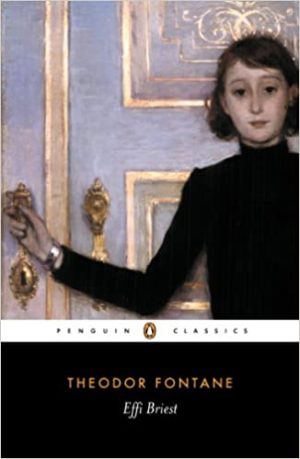Considering its description by Thomas Mann as one of the six most significant novels ever written, and rumoured to have moved Samuel Beckett to tears on even his fourth reading, Effi Briest by Theodor Fontane remains a remarkably little known novel outside of its native Germany. Set in 1880’s Prussia, Effi treads the well-worn path of the nineteenth century literary heroine. As an unworldly young woman in a status obsessed male-dominated world, her story tells of a stifling marriage of convenience. Prepare for adulterous downfall and a classic interpretation of the expression ‘pistols at dawn.’
We first meet Effi at the country home of the von Briest family, awaiting a guest her parents have invited for lunch. Radiant and happy-go-lucky, she is still childlike at seventeen, playing tag with her friends in the garden. Unbeknownst to Effi, today will prove to be the last day of her carefree childhood, as her parents’ visitor has more on his mind than mere lunch.
Baron von Innstetten, a 38-year-old civil servant, and one time suitor of Effi’s mother, is looking for a wife. A man ‘of character, position, and sound morality,’ he has cannily (if somewhat unimaginatively) targeted the aristocratic offspring of his former lady friend. To the modern reader, a bizarre and decidedly creepy turn of events, but to the pragmatic Frau von Briest, an excellent idea. “You’ll go far further than your mamma,” she tells her excited daughter, who begins to imagine her future in high society with a husband ‘who is going to be something in the world.’
Unfortunately, not only does Innstetten possess all the allure of a wet weekend in Würzburg, but his next government posting is to Kessin, a very dull and unhappening provincial town. With Innstetten working long hours and often away, Effi begins a slow and inevitable spiral into lonely despondency, fleetingly alleviated by the predictable arrival of a cradle next to her bed; ‘A pity it’s a girl,’ says the attending physician.
Having packed their daughter off like a lamb to marital slaughter, Effi’s hopelessly conformist parents ponder her future. Anticipating that her love for fun and adventure will be thwarted, they agree that ‘there’s something reckless in her that will risk anything.’
The arrival of Innstetten’s acquaintance, the married, flirtatious and caddish Major Crampas, tests that parental observation to the max.
Sometimes compared to fellow ‘adultery tragedies’, Anna Karenina and Madame Bovary, Effi Briest lacks their dramatic intensity, and this is why I admire it. A subtle writer, Fontane employs irony and restraint in his portrayal of Effi’s struggle to retain her selfhood in an oppressive society hidebound by convention. In favour of ‘too little rather than too much,’ key scenes are referred to obliquely, and left to the imagination. Note also Fontane’s frequent symbolism, the most poignant of which concerns the sundial and roundel of flowers in the Briest’s garden, referred to on Effi’s last day of childhood, and again on the moving final page of this compelling novel.
Effi Briest by Theodor Fontane is published by Oxford World’s Classics and Penguin Classics and translated by Mike Mitchell, 304 pages.





